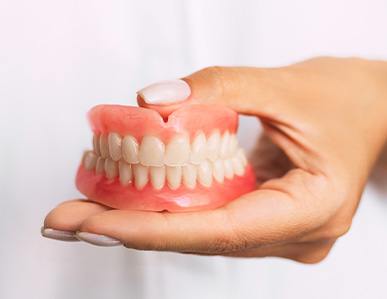
If you’re struggling with moderate to severe tooth loss, then you know all too well the negative toll it can take on your smile, bite, and speech. Fortunately, our phenomenal team at Hill Avenue Dental has a solution: modern dentures in Superior. These lifelike restorations can replace several teeth or an entire arch seamlessly, so you can smile confidently and chew effectively again. Take the next step by scheduling an appointment!

Thanks to advancements in dentistry, nearly everyone with lost teeth is a candidate for dentures. So, if you are missing multiple teeth or all of them, don’t hesitate to get in touch with our dentist in Superior! From there, Dr. Douglas Clark III can assess your dental needs and learn about your smile goals. If any preliminary treatments are needed, like a tooth extraction or gum disease therapy, we will work that into your treatment plan to ensure your dentures are a success.

You often don’t know what you’ve got until it’s gone—this saying is true when it comes to teeth. You can take them for granted, but losing teeth can make you realize just how much you utilize every day for nourishing your body and communicating. You may be stuck with a soft food diet, which can limit your options and drive you to more processed foods. Also, if you don’t replace missing teeth, your remaining teeth can spread out, which changes your bite and ability to eat. Talking and forming certain sounds also become challenging, and being unable to communicate clearly can be isolating and detrimental to your mental health as well as your overall health.
All this to say that dentures can help you overcome these effects!

For traditional dentures, there are relatively few requirements. In fact, other than missing multiple teeth, the only qualifying factor is that you have a healthy mouth. As long as you don’t have a gum infection, cavities, or any other oral issue, you should be in a good position to replace your teeth. Again, if you aren’t ready for dentures yet, we can work with you so that you can enjoy all the benefits that dentures offer.
For implant dentures, you’ll have to meet more criteria. You’ll also need to have a strong jawbone to support the implants.

Before you move forward with any tooth replacement solution, it’s important to consider all your available options. For some patients, traditional dentures are perfect for their needs, while a dental bridge could be more secure. Many others find the stability and strength of implant dentures perfect for permanent replacement.
During your consultation, we can discuss which options could best help you achieve your goals and complete your smile.

Depending on the extent of your tooth loss, our team will recommend one of the below options:
If you still have a few of your natural teeth intact, then partial dentures may be the best fit for you. With a gum-colored base and lifelike prosthetic teeth, this restoration is held in place with a discreet metal clasp.
Patients who are missing all of their teeth on one or both arches should consider full dentures. Although this option also has a gum-colored base and lifelike prosthetic teeth, it’s held in place with natural suction, denture adhesive, or a bit of both.
Implant dentures are where traditional dentures and state-of-the-art dental implants come together. Instead of clasping onto your natural teeth or staying on with natural suction, these restorations are anchored in place with titanium posts.

From dental bridges to dental implants, there are a variety of restorative dentistry solutions available to address tooth loss. So, why dentures? Here are a few benefits to consider:

It won’t be long into researching the cost of the different tooth-replacement options available that you realize just how cost-effective dentures are, especially when it comes to replacing a large number of teeth. Plus, dental insurance providers typically cover a portion of the cost, making your out-of-pocket expenses even lower. Rest assured, we will provide you with an estimate of the price at your appointment and walk you through the different financial solutions available as well.

When people think of dentures, they often imagine the obvious, bulky ones from decades prior. Thanks to advancements in both dentistry and technology, they look vastly different today. In fact, they are custom-made with each patient’s face shape, dental needs, and aesthetic preferences in mind, which makes them look and feel just like the real thing!

Another considerable perk: dentures can last for over a decade! The key is maintenance. That starts with daily habits, like soaking them in a dentist-recommended cleaner and taking good care of any remaining teeth you have. It’s also crucial that you break any bad habits, like smoking, and that you come to our office twice a year for a checkup and cleaning.

Unfortunately, many patients struggle with indigestion following tooth loss or have no choice but to stick to a diet comprised of only soft foods, like plain yogurt and applesauce. Fortunately, dentures are crafted from high-quality dental materials that are extremely durable. As a result, patients regain some of the strength of their bites, and they can eat a much more varied, nutrient-dense diet.

Patients who aren’t concerned about the aesthetics of tooth loss often are tempted to take the “wait and see” approach. However, the gaps in your smile can have a negative effect on your oral health as well. In fact, not replacing the teeth you’ve lost can lead to further tooth loss, bite problems, and other serious issues. So, don’t wait – schedule an appointment to learn more about your treatment options today!

Whether you’re missing one tooth or an entire arch, you know first-hand how difficult it is to enunciate clearly with gaps in your smile. Fortunately, partial dentures can fill in the open spaces and full dentures can replace every tooth. As a result, you won’t just feel better about your appearance, you’ll feel more confident when communicating with loved ones, friends, and colleagues!

Before getting dentures, it's important to know what to expect throughout the process. Understanding the materials used to create your dentures and how they fit into your mouth will help you appreciate the final result even more. Whether you're considering partial dentures, full dentures, or implant dentures, the overall process is similar for all types. Here's a closer look at what goes into creating your new smile.

Dentures are crafted using two main components:

Getting dentures is a multi-step process that typically takes a few weeks to a few months. Here’s what to expect:

When you first get your dentures, some discomfort is normal as your mouth adjusts. You may experience soreness or difficulty speaking and eating, but with time, your dentures will feel as comfortable as natural teeth. To speed up the process, stick to soft foods to ease the transition. You can also use denture adhesive to improve fit and stability. Practice speaking and chewing to strengthen mouth muscles. With proper care and patience, you’ll soon enjoy your new, functional smile with confidence!

From the different types of dentures in Superior to the numerous benefits they come with, reading through the above information is a great start if you’re trying to find the right tooth-replacement solution. With that being said, you may have one lingering question on your mind: how much do they cost? Since the price is an important factor, it’s a common question among prospective patients. Keep reading to learn what impacts the final price!

The cost of dentures in Superior will depend entirely on your dental needs, lifestyle habits, and smile goals. As a result, there are a few important factors that will play a role, including:
Don’t worry – our skilled dental team will review all of this information during your initial consultation. That way, you have an in-depth understanding of the path to your new and improved smile.

In short, the upfront cost of implant dentures is higher. That’s because they require oral surgery and multiple dental implants. However, it’s important to note that they could end up saving you money in the long-run. After all, implant dentures have a 15+ year lifespan, don’t require adjustments, and preserve your jawbone. So, it’s important to weigh the upfront cost and overall benefits/savings equally, especially when it comes to something as important as your smile, bite, and speech.

Since dentures are considered a necessary restorative treatment, most dental plans do cover a portion of the cost. In most cases, this tooth-replacement option is eligible for up to 50% of coverage. Plus, your plan may include benefits that can be used toward any necessary preliminary treatment as well. Fortunately, our knowledgeable team can help you navigate the ins and outs of your plan so understanding the cost is easy.

Our team is proud to welcome dental insurance, cash, check, and major credit cards. However, we also offer another option: flexible financing with CareCredit. With this trusted third-party lender, you can pick a payment plan that breaks up the cost of your care into manageable monthly chunks. Plus, little-to-no interest options are available for qualified patients. To learn more, get in touch with our team today!

True enough, dentures can quickly restore and beautify your grin. Dentists wouldn’t offer these prosthetics otherwise. Still, dentures won’t last long without good care. They must be looked after to work well and avoid breakage. Luckily, Hill Avenue Dental can assist with your maintenance efforts. Below are several great tips on caring for dentures. By using them, your new teeth will stick around for years to come. Read on to learn more, then, or call us for the details.

For starters, try to remove and rinse your dentures after eating. Chewing food causes “leftovers” to gather on your prosthetic teeth. However, rinses keep this debris from sticking around. You’ll then have a lower risk of gum disease and other oral problems.
All that said, don’t use hot water for the rinses. Intense heat can actually warp denture material. If such warping occurs, the restoration’s fit will be ruined. You’d then need to get a replacement.
In addition to rinses, always give your dentures once-daily cleanings. This habit will remove the bacteria and plaque that a rinse might miss.
Overall, you should find the cleanings easy to perform. Simply remove the denture from your mouth and clean it with a toothbrush. However, use hand soap instead of toothpaste. (Toothpaste is abrasive and erodes dentures.) After brushing, you can soak the dentures in a cleansing solution. You should then rinse them before putting the teeth into your mouth.
While solid and durable, dentures aren’t unbreakable. They can and will fracture under excess force. That being the case, ensure their safety when you aren’t using them.
As it happens, there are several good ways to protect dentures. One approach is to place a towel in your sink while cleaning them. (By doing so, the dentures are cushioned from falls.) Alternatively, you could store the dentures in a secure case. This form of storage will stop kids or pets from breaking the prosthetics.
In reality, you shouldn’t wear dentures when you sleep. It’s much better if you remove them before bed. Ideally, you’d soak them in a disinfecting solution overnight.
You see, constant denture use harms the body. This habit restricts gum circulation, leading to irritated mouth tissues. Wearing dentures to bed also raises your gum disease risk, as it elevates your mouth’s plaque levels. If you’re especially unlucky, sleeping with the teeth can cause pneumonia.
As you begin using dentures, monitor them and your mouth for changes. Sudden shifts can point to problems that need a dentist’s help. In fact, you should even watch for mouth sores, gum irritation, and signs of infection.
It’s especially crucial that you take damaged dentures to your dentist. If you try repairing them yourself, the situation will grow worse. Meanwhile, a qualified dentist has the proper training and resources. They could reline the dentures or even replace them.
While the exact amount of time will depend on your unique needs, the average wait time for traditional dentures is between six and eight weeks. That may seem like a long time, but it’s essential that you give your gums a chance to heal. Not only will this ensure your dentures fit properly, but it will also help prevent unpleasant irritation. The wait time for implant dentures, on the other hand, is around four to six months. That’s generally how long the process of osseointegration (the fusion of the implant post to the jawbone) takes.
Although sleeping with your dentures is certainly possible, it’s typically not recommended for a few reasons. First, your dentures restrict circulation to your gums, which can result in unwanted discomfort. Taking them out at night while you doze gives your mouth a break, ensuring the soft tissue has a chance to recover. Second, your dentures need to be disinfected regularly. Why not soak them in a denture-approved cleaner while they’re not in use? This will ensure they are free of plaque and harmful bacteria come morning.
The qualifications for partial, full, and implant-retained dentures are different. While partials are ideal for patients with a blend of missing and natural teeth, full dentures are designed to help patients who are missing all of their teeth. Regardless of the severity of your tooth loss, the first step is to schedule an appointment with our denture dentist in Superior. From there, they can identify the cause, screen for any untreated dental problems, like gum disease, and share your treatment options. Don’t worry – most patients are candidates since preliminary treatments, like bone grafts, are so effective.
Dentures are custom-made just for you, ensuring they won’t be bulky or obtrusive in any way. With that being said, it’s natural for you to experience a slight learning curve at first. Fortunately, with a bit of practice, you’ll be communicating easily in no time! Remember to be patient with yourself, speaking slowly at first. This will allow your tongue to acclimate to the presence of your denture. Biting down and swallowing before you talk will help expedite the process. Plus, if you have partial or full restorations, denture adhesive can help keep them securely in place as you speak.